Cauwood Surname Ancestry ResultsOur indexes 1000-1999 include entries for the spelling 'cauwood'. In the period you have requested, we have the following 5 records (displaying 1 to 5): Buy all | | | Get all 5 records to view, to save and print for £22.00 |
These sample scans are from the original record. You will get scans of the full pages or articles where the surname you searched for has been found. Your web browser may prevent the sample windows from opening; in this case please change your browser settings to allow pop-up windows from this site. Electors for Ecclesfield
(1848)
On 14 and 15 December 1848 an election took place for a Knight of the Shire for the West Riding of Yorkshire in the House of Commons. The candidates were Edmund Denison and sir Culling Eardley Eardley, gaining 14,743 and 11,795 votes respectively. The county franchise at this period included freeholders of land worth 40s or more a year; £10 copyholders and long-leaseholders; and £50 short-leaseholders and tenants. This poll book was published in 1849.
Former poll books had been compiled from the sheriff's returns; but as these were now transmitted to the Home Office immediately after an election, in this instance the polling was marked from the check-clerk's returns, carefully compared with the registers marked in the poll booths at the time of voting.
The votes for the respective candidates are indicated by the numerals 1 (Denison) and 2 (Eardley). The omission of these numerals indicates that the elector did not vote. Many names which appear on the register of particular townships are completely omitted in this poll book: in all these cases, the same name will be found recorded in some other township, the elector having two or more qualifications. In such cases, his name only appears in the poll book in the actual township for which he chose to vote; or, if he did not vote at all, in that township for which he was qualified that lay closest to his actual residence.
The townships are arranged alphabetically within polling district; and within each township the names are arranged alphabetically by surname and christian name, and the elector's residence is given. Many of the electors resided outside the township for which they were qualified - some in other counties. Moreover, at the end of each polling district there is a list of persons registered to poll in that district, from townships is other districts. CAUWOOD. Cost: £6.00.  | Sample scan, click to enlarge
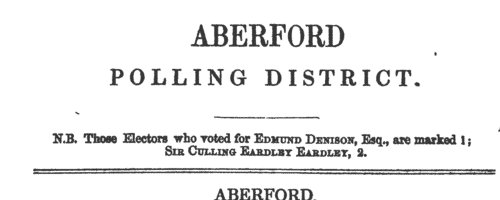
| Medical Men
(1853)
The British Medical Directory for England, Scotland, and Wales of 1853 lists doctors, physicians, surgeons and other medical men. Each entry gives full name, surname first; address; qualifications; public appointments; and (where appropriate) a list of books and of works published in medical journals.CAUWOOD. Cost: £4.00.  | Sample scan, click to enlarge
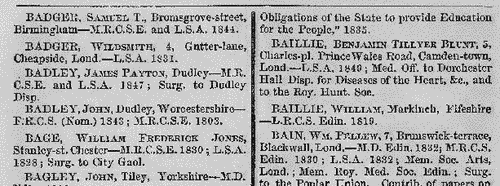
| Inhabitants of Blackheath, Lee, Greenwich, Eltham and Mottingham
(1937)
Kelly's Directory of Blackheath, Lee, Greenwich, Eltham &c. includes this directory of private residents, listed alphabetically by surname and christian name, with address, covering an area extending from the river Thames on the north to Mottingham and Grove Park on the south, and from Eltham on the east to Deptford Creek and Hither Green on the west. These abbreviations are used in the addresses: B, Blackheath; D, Deptford; E G, East Greenwich; G, Greenwich; L, Lee; and Lew, Lewisham.CAUWOOD. Cost: £4.00.  | Sample scan, click to enlarge
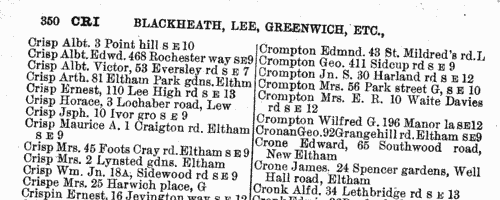
| Chemists
(1950)
The Royal Institute of Chemistry was founded in 1877, and was open only to British subjects (and also, in due course, to citizens of the newly-created Republic of Ireland). Associates of the institute (A. R. I. C.) qualified either by studying chemistry, physics, mathematics and an optional science for the institute's examination (which insisted on a high standard of practical laboratory efficiency); or by obtaining good honours degrees or equivalent qualifications, with chemistry as principal subject, and having undergone training in allied sciences. Associates of at least three years' standing could then be admitted to the Fellowship (F. R. I. C.) either by taking a further examination in a special branch of chemistry, or by submitting the results of work or evidence of experience sufficient to justify the Council in granting exemption from such further examination. This register of fellows and associates, correct to 31 August 1950, contains 11,545 names, arranged alphabetically, surname first (in capitals), with qualifications, current address, telephone number, and (in italics) a brief description of present post in the chemical industry. Finally, year of admission as associate (A.) (and, where appropriate, fellow (F.) is given on the right-hand side. With this may appear the notation (x) for a fellow of the Chemical Society, (y) for a member of the Society of Chemical Industry, or (z) for a joint subscriber to all three chartered bodies.CAUWOOD. Cost: £4.00.  | Sample scan, click to enlarge
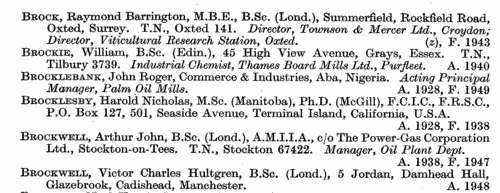
| Anglican clergy
(1957)
Crockford's Clerical Directory listed all Anglican clergy in the British Isles, India, Africa, Canada, the West Indies, Europe, Australasia and South America. The 77th issue, for 1957-58, is based on returns from all the individuals listed, and was deemed correct as of 30 September 1957. The details given are: name (surname first, in capitals) in bold; name of theological college and/or university, and degrees, with years; a bold d followed by year and diocese signifies date of ordination as deacon and by which bishop; then a bold p, similarly for ordination as priest; posts (C: curate; I: incumbent; V; vicar; R: rector) with parishes and years; address; telephone number; and lists of books &c. where appropriate. In the case of the man then holding an English, Irish, Scottish or Welsh benefice, additional details are given - a bold P signifies the patron of the advowson; then the income, with items such as Q. A. B. (Queen Anne's Bounty), Eccles(iastical) Comm(issioners), Fees, e. o. (Easter Offerings), Pew Rents, T(ithe) R(ent) C(harge), Gl(ebe), &c.CAUWOOD. Cost: £4.00.  | Sample scan, click to enlarge
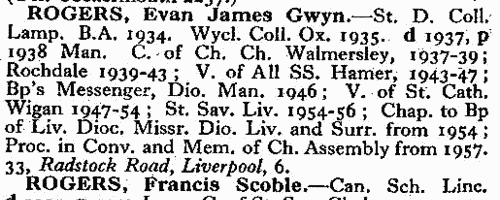
|
Research your ancestry, family history, genealogy and one-name study by direct access to original records and archives indexed by surname.
|







